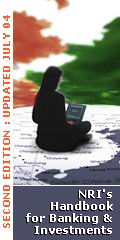|




|
Moody’s views Indian budget as a political and fiscal balance
Moody’s Investors Service says that India’s budget for 2008-2009 tries in the run up to national elections to tenuously balance short-term political imperatives with long-term developmental needs, while also trying to be consistent with key fiscal targets set forth in the “Fiscal Responsibility and Budget Management Act.”
“The budget is also particularly interesting as it marks not only the last for the Congress-led United Progressive Alliance government which is serving its final year, but also because it comes in the terminal year of the FRBMA,” says Aninda Mitra, a Moody’s VP/Senior Analyst. FRBMA was designed to institutionally underpin an improvement in India’s fiscal fundamentals.
Mitra, who is part of Moody’s Sovereign Risk Unit in Singapore, made his remarks in conjunction with the release of his special comment on the budget, which was announced on February 29. His report is entitled “India’s 2008-09 Budget Aims to Balance Politics and Fiscal Responsibility.”
“Additionally, the government does not make a more explicit provision for the Sixth-Pay Commission’s expected hikes of public sector salaries, nor does it establish a clearer mechanism or time-frame for transferring above the line – much less reducing or eliminating – sizeable off-budget liabilities (especially, oil and fertilizer subsidies),” says Mitra.
“As a result, the true extent of fiscal risk is substantially higher than nominally apparent,” says Mitra.
“Nevertheless, despite the budget’s populist tone, and its clear downside risks, Moody’s overall view is that continued revenue buoyancy could still underpin a level of fiscal performance that is consistent with incremental improvements in debt ratios,” says Mitra.
Furthermore, the budget’s emphasis on poor, less educated rural dwellers should boost agricultural incomes in a relatively in-expensive fashion, and at a politically expedient time.
“The projected growth in the central government’s budget expenditure looks extremely conservative, and this could very well be designed to make headroom for meeting additional expenses related to the Sixth Pay Commission’s public sector wage recommendations,” adds Mitra in his analysis.
“However, it is too soon to conclusively assess the impact without precisely knowing the full extent of the recommendations, or incorporating state-level budget impacts, responses and provisions,” he says.
“But what is clear is that in the coming months, on account of less discretionary control over its employees’ salaries, the central government’s credit fundamentals will grow increasingly dependent on the momentum of GDP growth and the buoyancy of tax revenues,” Mitra says in his report.
The budget’s revenue assumptions also remain strong (and actual out-turns could be stronger), with direct (individual and corporate) taxes expected to grow sizably, Mitra says. Meanwhile, the broadening of the service tax base has also rapidly begun adding to the overall tax take.
Moody’s views the annual budget as a key component of its assessment of the Indian government’s fiscal and debt metrics which are the main drivers of its Ba2 local-currency and Baa3 foreign-currency debt ratings.
(This is Moody’s release)
BUDGET REACTIONS from Indian Trade Associations... Click here
India's Fiscal Improvement Firmly In Place, But Slower Than Expected ... Click here
For full text of Indian Union Budget 2008-09... Click here
CLICK FOR MORE FEATURES & STORIES
|
|


|







